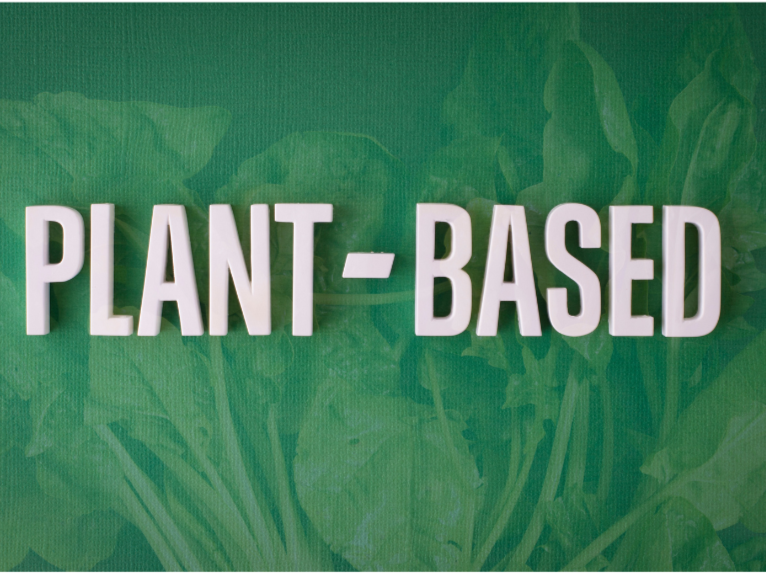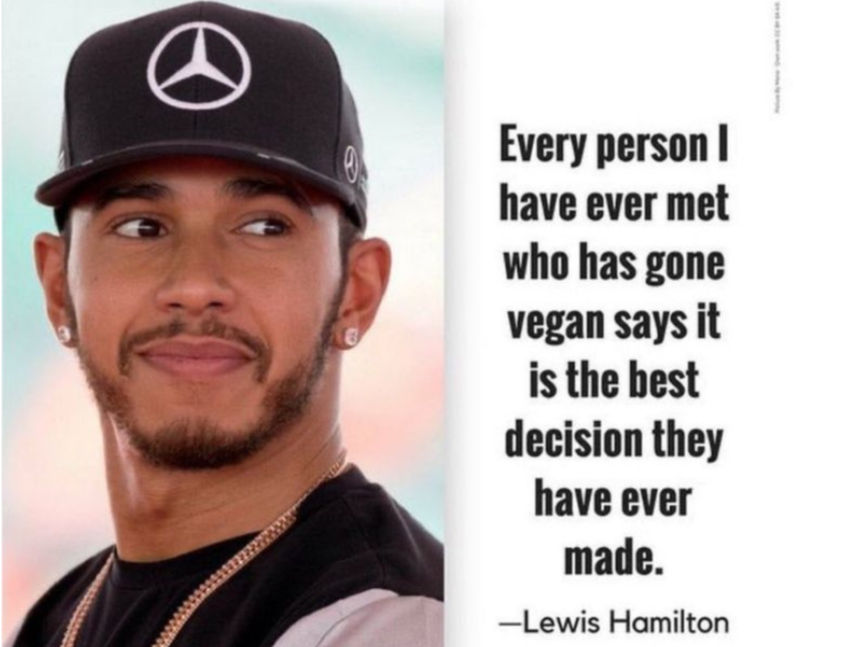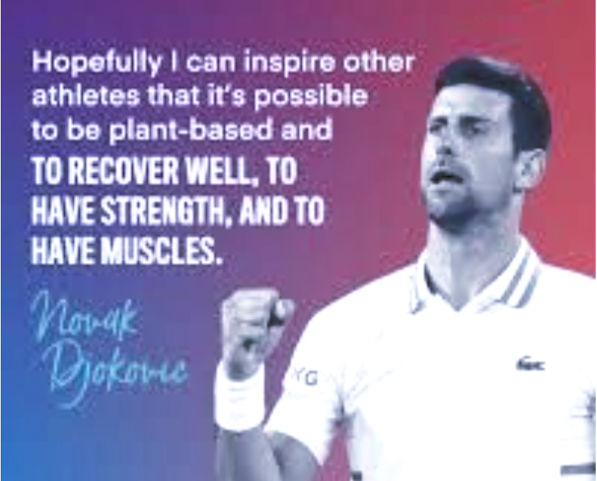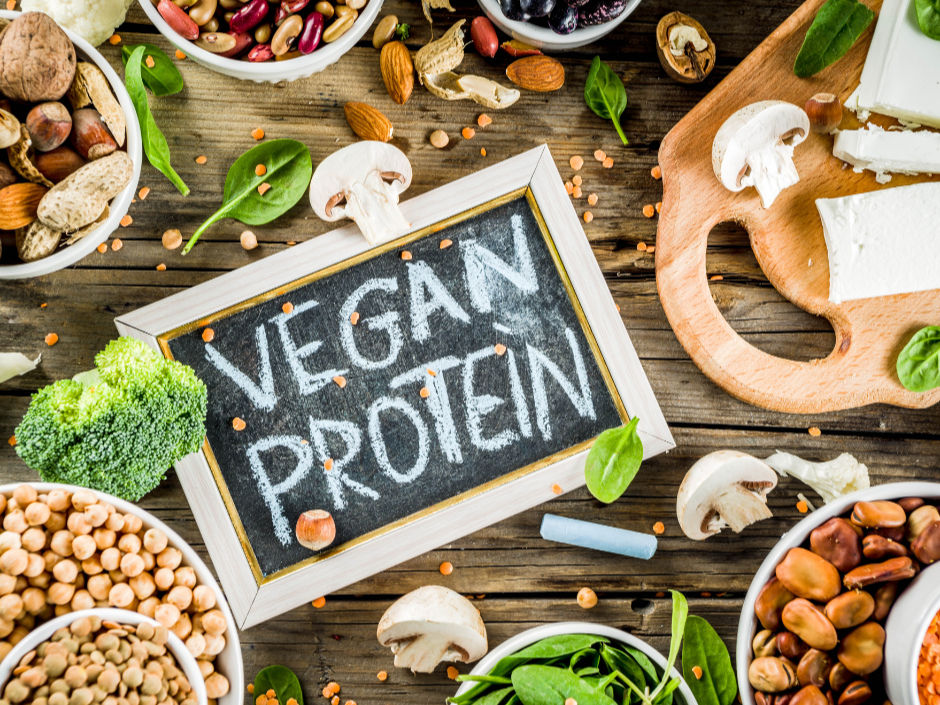Fueling Greatness: How Elite Athletes are Succeeding on a Vegan Diet
- Jan 16, 2025
- 3 min read

In the world of elite sports, diet plays a crucial role in performance and recovery. For many years, there has been a common misconception that a vegan diet lacks the necessary nutrients for high-performance athletes. However, several elite athletes have shattered this myth by excelling in their sports while maintaining a plant-based diet. Among them are Formula 1 champion Lewis Hamilton and tennis legend Novak Djokovic, who have both seen significant improvements in their performance and overall health after switching to a vegan diet.

Lewis Hamilton: Formula 1 Champion
Lewis Hamilton, the seven-time Formula 1 World Champion, made the switch to a vegan diet in 2017. Initially met with skepticism regarding protein deficiencies, Hamilton has since proven that plant-based nutrition can fuel even the most demanding athletic careers. His commitment to a vegan lifestyle extends beyond the racetrack, reflecting his advocacy for animal rights and environmental sustainability.
Achievements on a Vegan Diet:
2017-Present: Multiple Grand Prix victories and continued dominance in Formula 1.
2018: Became the first driver to win four consecutive titles since Michael Schumacher.
2020: Equaled Michael Schumacher's record of seven World Drivers' Championships.
Novak Djokovic: Tennis Legend

Novak Djokovic, a tennis icon with 23 Grand Slam titles, switched to a vegan diet in 2010 due to various health issues, including allergies to gluten, dairy, and processed sugar. Since adopting a plant-based diet, Djokovic has reported significant improvements in his health, performance, and mental clarity. His dietary choices have played a crucial role in his sustained success and longevity in the sport.
Achievements on a Vegan Diet:
2011-2024: Djokovic won numerous Grand Slam titles, including Wimbledon, the US Open, and the Australian Open.
2015: Achieved the highest number of ATP ranking points in a single season.
2021: Became the first player to hold all four Grand Slam titles simultaneously on three different surfaces.
Debunking Common Misconceptions About Vegan Diet.

Protein Deficiency: One of the most widespread myths about vegan diets is that they do not provide enough protein, which is essential for muscle building and recovery. However, numerous plant-based foods are rich in protein and can adequately meet an athlete's needs.
Category | Examples |
Legumes | Lentils, chickpeas, and black beans. |
Nuts and Seeds | Almonds, chia seeds, and hemp seeds. |
Whole Grains | Quinoa, farro, and brown rice. |
Tofu and Tempeh | Both made from soybeans and are excellent sources of protein. |
How Athletes Like Lewis Hamilton and Novak Djokovic Address Protein Needs:
Lewis Hamilton: Incorporates a variety of protein-rich foods into his diet, including legumes, tofu, and quinoa. His meals are carefully planned to ensure he gets the necessary amino acids for muscle repair and growth.
Novak Djokovic: Focuses on a diverse range of plant-based proteins, such as lentils, beans, and nuts. He often combines different protein sources to achieve a complete amino acid profile.

Lack of Energy and Endurance: Another misconception is that vegan diets may lead to decreased energy levels and endurance. In reality, a well-balanced vegan diet can provide sufficient carbohydrates, healthy fats, and proteins to fuel high-intensity training and competitions.
Category | Examples |
Complex Carbohydrates | Sweet potatoes, oats, and whole grain bread. |
Healthy Fats | Avocado, nuts, and olive oil. |
Iron-Rich Foods | Spinach, lentils, and fortified cereals. |
How Athletes Like Lewis Hamilton and Novak Djokovic Maintain Energy Levels:
Lewis Hamilton: Consumes a mix of complex carbohydrates and healthy fats to sustain energy throughout the day. His diet includes plenty of fruits, vegetables, and whole grains to keep his glycogen stores replenished.
Novak Djokovic: Ensures a steady intake of energy-boosting foods like quinoa, avocados, and nuts. He also pays attention to iron-rich foods to maintain optimal blood oxygen levels, which is crucial for endurance.

Insufficient Recovery and Muscle Repair: The belief that vegan diets cannot support adequate recovery and muscle repair is another common misconception. In fact, plant-based foods can provide the necessary nutrients for effective recovery.
Category | Examples |
Antioxidant-Rich Fruits | Berries, oranges, and kiwi. |
Omega-3 Fatty Acids | Flaxseeds, chia seeds, and walnuts. |
Magnesium-Rich Foods | Dark leafy greens, bananas, and almonds. |
How Athletes Like Lewis Hamilton and Novak Djokovic Optimize Recovery:
Lewis Hamilton: Incorporates a variety of antioxidant-rich fruits and magnesium-rich foods into his diet to reduce inflammation and support muscle recovery.
Novak Djokovic: Includes omega-3 fatty acids from flaxseeds and walnuts to aid in muscle repair and reduce soreness. He also focuses on a diet rich in dark leafy greens and fruits to enhance recovery.
Conclusion
By embracing a vegan diet, elite athletes like Lewis Hamilton and Novak Djokovic have successfully debunked common misconceptions about plant-based nutrition. They have demonstrated that with proper planning and a diverse range of plant-based foods, it is possible to meet all nutritional needs, maintain high energy levels, and achieve outstanding athletic performance. Their stories serve as inspiration for anyone considering a vegan lifestyle, proving that a plant-based diet can indeed support elite-level performance.




Comments